The Vatican’s Unique Governance Model

An estimated 200,000 people gather in St. Peter’s Square and the neighbouring streets to attend the funeral Mass for Pope Francis at the Vatican on April 26, 2025. (CNS Photo/Stefano Spaziani, pool)
By Jason Scott – As we await the upcoming conclave, it is essential to understand the unique form of governance that defines the Vatican and the Catholic Church. Far from being a democratic institution, the Church operates under a model that could be described, by way of simplification, as a theocratic monarchy, with the pope at its helm.
The Vatican’s governance is rooted in tradition and divine authority rather than the principles of democracy or majority rule. This system is designed to preserve the Church’s spiritual mission and its teachings, which are seen as immutable and divinely inspired. The pope, as the Bishop of Rome and the universal pastor of the Catholic Church, holds the highest authority, a position that mirrors the role of a monarch but is guided by the teachings of Christ and the guidance of the Holy Spirit.
The pope’s authority is not derived from the people but from God, as articulated in the doctrine of papal primacy and infallibility. This model ensures that the Church remains focused on eternal truths rather than being swayed by the shifting sands of public opinion or political ideology.
While the pope holds primacy as the successor of Peter, collegiality affirms that bishops, united with the pope, together share in the governance and teaching authority of the universal Church through mutual listening, collaboration and synodal discernment. Collegiality also includes the bishops’ responsibility to teach and sanctify the faithful in union with the pope.
The pope is assisted by the Roman Curia, a central governing body composed of various dicasteries and offices that help administer the universal Church. These positions are appointed by the pope.
The Church’s model of governance is grounded in its belief that moral and spiritual truths are not subject to popular vote. This stance is reflected in the Church’s teachings on natural law, which assert that certain moral principles are inherent in human nature and universal, transcending opinion or legislative action. As Pope Benedict XVI stated in Caritas in Veritate (2009): “The moral order is not determined by majority vote. The dignity of the human person and the sanctity of life are not subject to the approval of the masses. The Church must remain steadfast in proclaiming the truth, even when it is unpopular or opposed by the majority.”
In this context, the Vatican’s governance model serves as a bulwark against moral relativism and individualism. The Church engages with contemporary moral issues, but always while maintaining its teachings. From that basis, it can give pastoral application to these teachings, as Pope Francis often did. It is a reminder that authority, when rooted in tradition and divine truth, provides stability and legitimacy, offering a moral framework that transcends the fleeting concerns of the moment.
As we approach the conclave, let us unite in prayer for the cardinals as they prepare for this sacred event. May the Holy Spirit guide them in their deliberations, ensuring that the Church continues to be a beacon of faith, hope and love. Let us pray for the strength and discernment of those who will choose the next leader of our Church, trusting in the divine plan that has guided the Church for over two millennia.
- What the Pope Said This Week - October 17, 2025
- Decline in Reverence at Mass - October 16, 2025
- Dilexi Te: Leo XIV’s First Exhortation – A Love That Speaks and Demands - October 12, 2025





